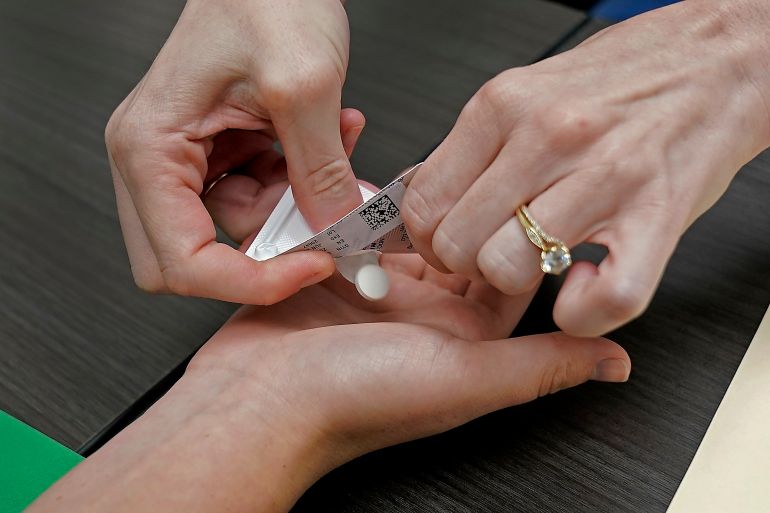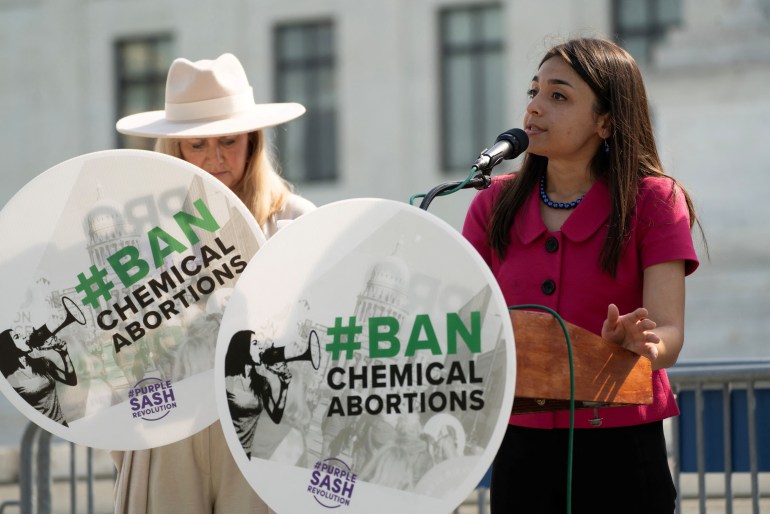US Supreme Court upholds access to abortion pill mifepristone
The ruling preserves broad access to mifepristone, while litigation continues over the pill’s approval for US use.

The United States Supreme Court has ruled to block lower-court decisions that would have placed restrictions on mifepristone, one of the pills used in half of the abortions in the country, while litigation proceeds.
The brief paragraph-long order grants a stay on any restrictions, handing a victory to the administration of Democratic President Joe Biden and mifepristone’s manufacturer Danco Laboratories, which had appealed the lower courts’ rulings.
Keep reading
list of 3 itemsBiden administration to bring abortion pill case to Supreme Court
Florida Governor DeSantis signs abortion ban into law
In response to Friday’s decision, Biden issued a statement calling on voters to take the issue of abortion access to the polls.
“The stakes could not be higher for women across America,” he wrote, promising to fight “politically driven attacks on women’s health”.
“But let’s be clear – the American people must continue to use their vote as their voice, and elect a Congress who will pass a law restoring the protections of Roe v Wade,” Biden added, citing a landmark 1973 Supreme Court decision that protected the constitutional right to abortion for nearly half a century.
That precedent was overturned in June 2022 under the court’s current six-to-three conservative majority, leading to legal challenges across the US that seek to limit abortion access.
Many Democrats and abortion advocates hailed Friday’s decision, though they were quick to note it was a temporary stopgap while the court case over mifepristone’s availability continued.
“This fight is not over,” Massachusetts Senator Elizabeth Warren wrote on Twitter. “Extremist Republican politicians continue to chip away at women’s rights to make their own health care decisions across the nation.”
This case marks the first time the Supreme Court has weighed abortion access since the decision to overturn Roe v Wade. Critics see the case as a threat to the federal government’s regulatory authority to approve medications and determine drug safety.
Friday’s decision is likely to leave mifepristone access unchanged for months as legal appeals continue to weigh its federal approval.
Abortion rights in the United States are under attack. Since conservatives on the Supreme Court overturned Roe v. Wade, 13 states have fully banned abortions; and on April 7, an unelected judge in Texas issued a radical decision rescinding FDA approval of the drug mifepristone. pic.twitter.com/yLZI8OMFW2
— Cory Booker (@CoryBooker) April 21, 2023
Conservative Supreme Court Justices Clarence Thomas and Samuel Alito, however, opposed the court’s decision on Friday to leave mifepristone access unchanged.
In his dissent, Alito dismissed concerns that “regulatory chaos” would ensue if the Supreme Court enforced the restrictions on mifepristone.
He also accused the US Food and Drug Administration (FDA) – the agency that approved mifepristone in 2000 – of “evading both necessary agency procedures and judicial review”, echoing a criticism issued by a lower court in the case.
“At present, the applicants are not entitled to a stay because they have not shown that they are likely to suffer irreparable harm in the interim,” Alito wrote in his dissent, noting the restrictions proposed would “simply restore the circumstances that existed” from 2000 to 2016.
His opinion, he added, did not “express any view” about “whether the FDA acted lawfully in any of its actions regarding mifepristone”, which is the central issue in the ongoing litigation.

The Supreme Court’s ruling on Friday stems from a decision that originated earlier this month in Amarillo, Texas, with US District Judge Matthew Kacsmaryk.
The Trump appointee had granted a request from anti-abortion plaintiffs on April 7 to temporarily suspend mifepristone’s approval while he weighed a case over whether the FDA had erred in authorising the medication more than 20 years ago.
An anti-abortion rights coalition, called the Alliance for Hippocratic Medicine, was among the plaintiffs suing the FDA over its mifepristone approval.
Kacsmaryk’s injunction would have effectively removed mifepristone from the US market. But his decision offered seven days for the Biden administration to appeal before the injunction took effect.
The administration quickly appealed and the case landed in New Orlean’s 5th Circuit Court of Appeals.
The appeals court’s decision on April 12 kept mifepristone available but also upheld restrictions from Kacsmaryk’s decision that would have rolled back access to 2016 standards.
Those restrictions included allowing the use of mifepristone only up to seven weeks of pregnancy, rather than 10 weeks, as the FDA has allowed in recent years. They would have also barred mifepristone from being delivered through the mail and would have required patients to arrange three in-person doctor visits to receive the pill.
In response, the Biden administration and the drug manufacturer Danco issued emergency requests appealing to the Supreme Court to block the restrictions, resulting in Friday’s decision.
The Supreme Court, however, did not issue an opinion about the overall merits of the case against the FDA and its approval of mifepristone, allowing for the possibility of future restrictions to be imposed.
The appeal now returns to a three-judge panel on the 5th Circuit Court of Appeals, which is set to hear arguments on May 17.
Today’s ruling by the Supreme Court is the right decision for millions of women nationwide. But it is only temporary. The fight to protect women’s health freedom is not over yet.
As this case proceeds, Democrats will never stop fighting to ensure access to this vital medication.
— Nancy Pelosi (@SpeakerPelosi) April 21, 2023
The White House has repeatedly said it is ready for “a long legal fight if necessary” to protect access to mifepristone.
But on Friday, anti-abortion groups likewise declared their intention to continue fighting to restrict the medication.
Erik Baptist, senior counsel for the conservative Christian group Alliance Defending Freedom, released a statement saying his organisation would pursue the case on an “expedited basis in the lower courts”.
“The FDA must answer for the damage it has caused,” Baptist said, calling the pill dangerous. “We look forward to a final outcome in this case that will hold the FDA accountable.”
Mifepristone is one of two medications used in medication abortions, which account for an estimated 53 percent of legal abortions, according to the pro-abortion Guttmacher Institute. The second pill, misoprostol, can be used alone to end a pregnancy in its early stages but doctors say the procedure is more effective with both medications.
Mifepristone is also used to help patients who suffer from miscarriages as well as to treat conditions like Cushing’s syndrome, which occurs when the body produces too much of the hormone cortisol. It is widely considered safe to use.
A separate court case – filed in Washington state by 12 Democratic-led states – sought to remove mifepristone from the FDA’s Risk Evaluation and Mitigation Strategy programme to further ease access to the pill. It called existing regulations on mifepristone “particularly burdensome”.
The federal judge in that case, Thomas Rice, issued a preliminary injunction on any new restrictions on mifepristone, minutes after the Kacsmaryk decision in Texas on April 7.
A third case has been filed by GenBioPro, maker of a generic version of mifepristone, in a federal court in Baltimore, Maryland. It too seeks to make restricting mifepristone more difficult by barring the FDA from potentially revoking the medication without a formal hearing.
One of the US’s most high-profile reproductive healthcare groups, Planned Parenthood, celebrated the Supreme Court’s decision on Friday with a statement.
“This is good news,” it wrote on social media. “But the facts remain the same: Access to mifepristone should never have been in jeopardy in the first place.”